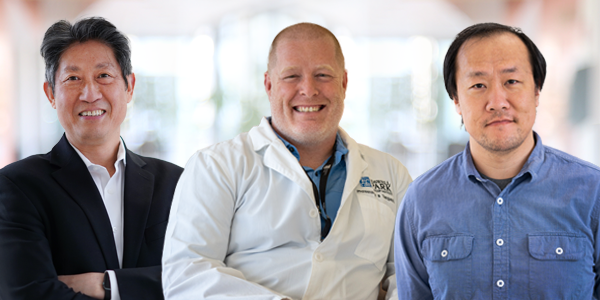Using multiomics, team identifies novel therapeutic targets in castration-resistant prostate cancer
- Study clarifies the origin of castration-resistant prostate tumor cells
- Team identified major castration-resistant prostate epithelial cell group, L1
- Work may lead to new therapeutic targets to treat advanced prostate cancer
BUFFALO, N.Y. — A research effort led by Dean Tang, PhD, of Roswell Park Comprehensive Cancer Center sheds light on a critical area of oncologic study — the biology and mechanisms behind castration-resistant prostate cancer. The team’s findings, published today in the journal Cell Stem Cell and reflecting six years of collaborative research, offer a new understanding of castration resistance and prostate cancer biology that could point the way to new treatment strategies.
“Understanding prostate response to hormone therapy and androgen receptor signaling inhibitors is crucial for enhancing long-term survival for prostate cancer patients,” notes Dr. Tang, who is Chair of Pharmacology & Therapeutics at Roswell Park. “Our work helps fill a critical gap in knowledge and in the work to identify a population of castration-sensitive cells that can be ‘trained’ or reprogrammed to become castration-resistant and drive recurrence.”
With an estimated 35,000 American men expected to die from metastatic castration-resistant prostate cancer (mCRPC) in 2024, as projected by the American Cancer Society, this disease remains a leading cause of death in the U.S. After two decades of decline, prostate cancer incidence rates increased by 3% annually from 2014 to 2019, driven in large part by diagnoses of advanced prostate cancer.
The proportion of men diagnosed with distant metastases, who have a 5-year survival rate of approximately 30%, has doubled from 2011 to 2019, coinciding with the introduction of next-generation androgen receptor signaling inhibitors, such as enzalutamide, into clinical practice, notes Dr. Tang.
Patients with advanced and metastatic prostate cancer who are not eligible for surgical resection, also known as prostatectomy, are typically treated with androgen deprivation therapy (ADT) — a treatment approach sometimes referred to as chemical castration — or a combination of ADT and an androgen receptor signaling inhibitor (ARSI). Unfortunately, most patients develop resistance to ADT/ARSI within two years.
While significant progress has been made in understanding the molecular mechanisms that lead prostate tumors to become resistant to these drugs, little is known about the population of tumor cells that survive ADT/ARSI treatment and drive prostate cancer recurrence. To gain a better understanding of this issue, Dr. Tang, alongside Roswell Park colleagues and co-corresponding authors Jason Kirk, PhD, of the Department of Pharmacology & Therapeutics, and Tao Liu, PhD, of the Department of Biostatistics & Bioinformatics, initiated the study.
Using an experimental preclinical model, Dr. Tang and colleagues used single-cell multiomics, a state-of-the-art single-cell analysis platform, to analyze approximately 230,000 cells. This led to the identification of several new cell populations, including a major castration-resistant prostate epithelial cell population, referred to as L1.
“By integrating the two single-cell analysis pipelines, called scRNA-seq and scATAC-seq, we were able to delve deep, for the first time, into L1 and gain a portrait of both the transcriptome — the entire RNA repertoire — and chromatin landscape — how the DNA is packaged in the cell nucleus — of the L1 cells,” says Dr. Tang.
“Our analysis showed that these castration-reprogrammed castration-resistant L1 cells have high stem cell features, making them share some similarities with the population of pre-existing stem cells in the prostate,” he explains.
Multiple subsequent preclinical experiments demonstrated that the castration-induced L1 cells are distinct from the pre-existing stem cells and are capable of surviving castration and mediating regeneration, causing prostate cancer recurrence.
“By focusing on L1 cells, we uncovered a slew of novel cell surface markers, including CLU, GPRC5A and ITGA2, as well as transcriptional regulators — proteins that generally function in the nucleus to regulate gene expression, such as FOXQ1 and GRHL2, which specifically function in the castration-resistant L1 cells,” reports Dr. Tang.
“Of clinical significance, our team has demonstrated the presence of L1 or L1-like cells in patients with castration-resistant prostate cancer, and many of those L1-specific markers and nuclear regulators are also upregulated in human castration-resistant prostate cancer,” he adds.
Based on these findings, the team is working with collaborators to develop novel therapies such as cancer treatment vaccines capable of targeting the molecules like GPRC5 and FOXQ1. Such new targeted therapies, when successful, could be used in combination with ADT/ARSI to treat patients with advanced and castration-resistant prostate cancer.
The team’s rich datasets can be accessed through the new publication. This project was funded in part by the National Cancer Institute (grants R01CA237027, R01CA240290, R21CA237939, R21CA218635, U24CA274159 and P30CA016056), U.S. Department of Defense (grants PC220137 and PC220273), a Prostate Cancer Foundation Challenge Award, and by additional support from the Roswell Park Alliance Foundation and George Decker Endowment.
###
From the world’s first chemotherapy research to the PSA prostate cancer biomarker, Roswell Park Comprehensive Cancer Center generates innovations that shape how cancer is detected, treated and prevented worldwide. Driven to eliminate cancer’s grip on humanity, the Roswell Park team of 4,000 makes compassionate, patient-centered cancer care and services accessible across New York State and beyond. Founded in 1898, Roswell Park was among the first three cancer centers nationwide to become a National Cancer Institute-designated comprehensive cancer center and is the only one to hold this designation in Upstate New York. To learn more about Roswell Park Comprehensive Cancer Center and the Roswell Park Care Network, visit www.roswellpark.org, call 1-800-ROSWELL (1-800-767-9355) or email ASKRoswell@RoswellPark.org.
Annie Deck-Miller, Director of Public Relations
716-845-8593; annie.deck-miller@roswellpark.org
